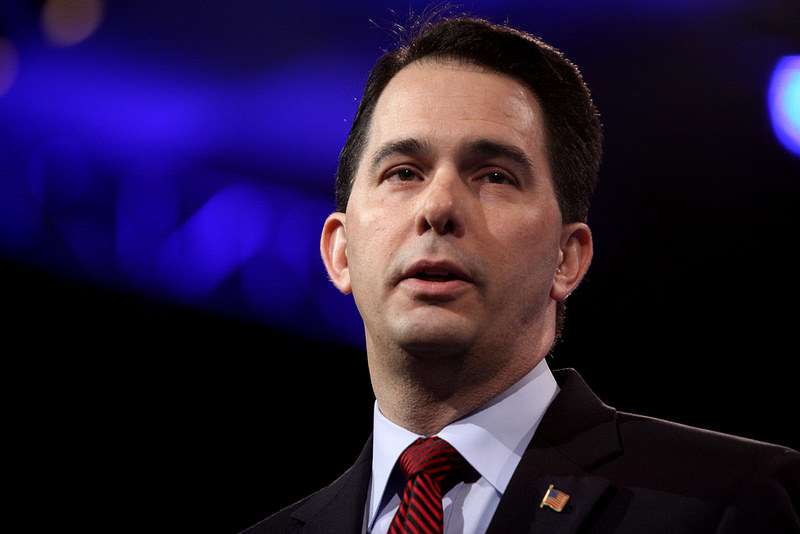The Scott Walker Campaign Disaster
New national poll puts him at no measurable support.

[Update, 6 p.m. - Walker is ending his campaign as of this evening.]
The biggest disaster in the GOP presidential race, by far, is the Scott Walker campaign.
After a breakout speech at an Iowa forum in January, Walker quickly vaulted into the top tier of Republican candidates. By March, the Wisconsin governor was tied for second-most-likely to win the nomination in one bookmaker's odds, and he was polling just five points behind Hillary Clinton in nationwide matchups—better than other GOP contenders. A profile in The Miami Herald opened with the declaration that he "may be the biggest threat to the presidential ambitions of Jeb Bush and Hillary Clinton."
Walker continued to perform well throughout the summer, when he made his run official. As Donald Trump rose to the top of the pack, Walker was close on his heels, pulling into second place in late July. At the beginning of August, The New Yorker's Amy Davidson looked at Walker's standing and suggested that if Trump started to fade, Walker might be the best positioned to take the lead—and the eventual nomination.
Just two months ago, in other words, looked like a very real contender for the prize, and perhaps even the shadow frontrunner.
Today, he looks like the GOP field's biggest loser. A CNN/ORC poll released yesterday—the first national poll since last week's GOP debate—found Walker with literally no measurable support. The candidate received an asterisk, meaning that less than 1 percent of those polled said they supported him.
This isn't the first piece of bad news the Walker campaign has received. Nationally, he's been nose-diving since the first debate. He's also been sliding rapidly in Iowa, a state he once led, and where his campaign has focused most of its resources.
The extraordinarily poor showing in the CNN poll may prove to be an outlier, but even still, the overall trend is clear. And given that Walker's campaign is already showing signs of organizational weakness, with once-loyal donors sending money to other GOP candidates, and a whisper campaign amongst supporters pushing for Walker to fire his campaign manager, this dreadful result may be enough to kill Walker's campaign permanently.
Even if Walker's campaign struggles forth, it's hard to see him having much chance at winning the nomination. It'll be a zombie campaign, shuffling onward but with no real life left.
What went wrong? I cataloged a number of Walker's specific missteps earlier this month, most of which involved aggressive pandering, shameless flip-flopping, or a failure to clearly articulate and stick to his positions.
But the larger issue, I think, is that Scott Walker the candidate has not in any meaningful way lived up to the promise of Scott Walker the governor. Walker first rose to national prominence after his successful showdown with Wisconsin's public sector unions, and his subsequent victory in a recall election and then a second-term reelection campaign in a state that went for Barack Obama twice. The Iowa speech in January that launched his candidacy into the top tier was built around that showdown; its essential pitch was that a Walker presidency would bring the same mix of political strength and big-ticket policy wins.
But the Walker campaign approached both politics and policy awkwardly, in ways that didn't live up to that initial promise. Walker gave a good speech, but he didn't vary it much, and he had trouble going off script or answering questions on a variety of national issues. He struggled to stand out in debates for similar reasons.
On the policy front, Walker got tripped up by news-cycle shiny objects—immigration and birthright citizenship, the Iran deal, ethanol mandates, abortion, and gay marriage—that had little or no connection to the governing record he was supposedly running on, and that other candidates were better suited to tackle. At the same time, he was slow to roll out the sort of big-ticket domestic policy reforms that should have been the core of his campaign, and that his initial rise seemed to portend, and he didn't promote them effectively when he did. It wasn't until last week, for example, that he put forth a plan to reform federal public sector unions—plans he barely mentioned at the debate.
Walker, like all of the GOP candidates with conventional political backgrounds, has been hurt by Donald Trump's candidacy and by the wider interest in non-traditional candidates. But he's done himself no favors with the shallow, inept campaign he's run. His rapid initial rise was powered by the promise of a hard-charging, policy-reform driven campaign that, in the end, never really materialized. That's what people saw in Scott Walker back in January. It's what made him stand out initially, and what his supporters hoped his campaign would eventually offer. It never did. The Scott Walker who did emerge, meanwhile, couldn't compete on the hot-button issues he chose to engage on.
So maybe it's no surprise that almost no one supports Walker at this point—unlike Walker the governor, Walker the candidate has given almost no one any reason to support him.


Show Comments (128)